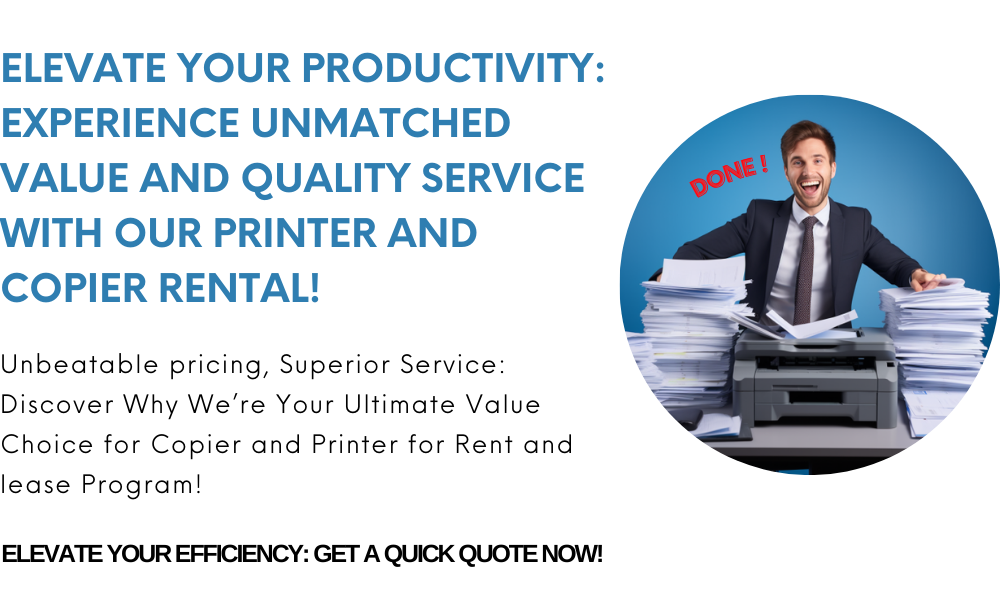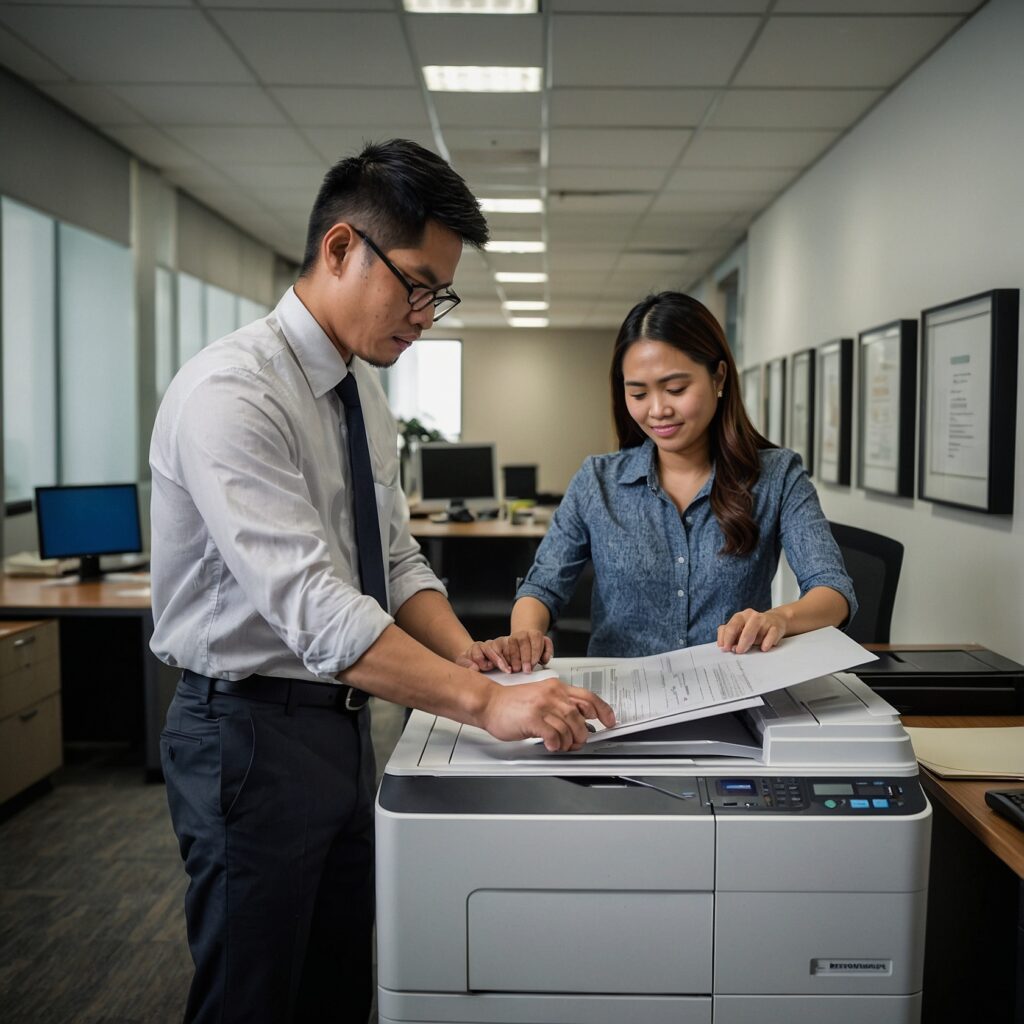
The Ultimate Guide to Copier Leasing for Small Businesses

The Ultimate Guide to Copier Leasing for Small Businesses
Part 1: Why Copier Leasing is a Game-Changer for Small Businesses
Introduction
For small businesses, efficient document management is essential, but outright purchasing a copier can strain a tight budget. Copier leasing presents a cost-effective and flexible solution, offering access to advanced equipment without the upfront expense. This guide dives into the ins and outs of copier leasing, focusing on its benefits, key considerations, and how it can empower small businesses in the Philippines to thrive.
What is Copier Leasing?
Copier leasing is a service where businesses rent a copier for a fixed period, typically under a contract. The agreement often includes maintenance, repairs, and sometimes consumables like toner. Leasing eliminates the need for a significant upfront investment, making it an attractive option for businesses looking to optimize cash flow.
Key Features of Copier Leasing:
- Access to modern equipment without a purchase commitment.
- Fixed monthly payments for easier budgeting.
- Maintenance and support included in most agreements.
- Flexibility to upgrade to newer models as needed.
Benefits of Copier Leasing for Small Businesses
1. Low Initial Costs
Purchasing a copier outright can cost tens or even hundreds of thousands of pesos, a significant financial burden for small businesses. Leasing allows businesses to allocate resources to growth initiatives instead.
Example: A startup in Manila redirected funds saved from leasing to marketing campaigns, which increased their customer base by 25% in the first year.
2. Predictable Monthly Expenses
Leasing simplifies budgeting with fixed monthly fees, eliminating unexpected repair or maintenance costs. This predictability is especially important for businesses with tight cash flows.
3. Access to the Latest Technology
Technology evolves rapidly, and owning a copier can lead to obsolescence. Leasing ensures access to modern machines with features like cloud connectivity, mobile printing, and energy efficiency.
4. Maintenance and Repairs Included
Most leasing agreements include maintenance and repairs, saving small businesses from the hassle and expense of finding reliable technicians.
5. Scalability for Growing Businesses
Leasing provides the flexibility to upgrade to larger or more advanced copiers as a business grows. This scalability ensures that businesses can adapt to increasing document management needs.
Common Leasing Terms and Policies
Understanding the terms of a copier lease agreement is crucial for maximizing its benefits. Here’s a breakdown of common policies:
1. Contract Length
Leasing agreements typically range from 12 to 60 months. Longer contracts often come with lower monthly fees but may be less flexible for businesses expecting rapid changes in their needs.
2. Maintenance Coverage
Most leases include regular maintenance, repairs, and part replacements. Ensure the agreement specifies response times and the scope of covered services.
3. Consumables Policy
Some leases include consumables like toner, while others require businesses to purchase these separately. Clarify what’s included to avoid unexpected costs.
4. Early Termination Fees
Canceling a lease early may result in penalties. Review the agreement for early termination clauses and negotiate terms that provide flexibility if needed.
5. Upgrade Options
Many leasing companies allow businesses to upgrade to newer models during the lease term. This ensures access to the latest technology without waiting for the contract to expire.
Choosing the Right Copier for Your Business
Not all copiers are created equal, and selecting the right model can make a significant difference in productivity and cost-effectiveness.
1. Assess Your Printing Needs
Consider factors like print volume, color vs. black-and-white requirements, and additional features such as scanning or faxing. For instance, a graphic design agency may need a high-resolution color copier, while an accounting firm might prioritize speed and reliability.
2. Look for Energy Efficiency
Copiers with energy-saving modes can reduce electricity costs, contributing to both sustainability and savings.
3. Evaluate Advanced Features
Features like cloud integration, mobile printing, and secure document handling can streamline workflows and enhance productivity.
4. Consider Space Requirements
Compact models are ideal for small offices with limited space. Measure your workspace to ensure the copier fits comfortably.
How Copier Leasing Supports Sustainability
Leasing a copier aligns with sustainable practices, reducing a business’s environmental impact in several ways:
1. Reduced Equipment Waste
Leasing minimizes the disposal of outdated copiers, as providers refurbish and repurpose machines.
2. Energy-Efficient Models
Modern leased copiers are often more energy-efficient than older models, lowering electricity consumption.
3. Consumable Recycling
Many leasing companies offer recycling programs for toner cartridges and other consumables, reducing waste sent to landfills.
Real-Life Example: A Small Business Success Story
The Challenge:
A small logistics company in Cebu struggled with outdated equipment that frequently broke down, disrupting operations and increasing repair costs.
The Solution:
They leased a multifunction copier with cloud integration and mobile printing capabilities. The leasing agreement included maintenance and consumables, simplifying operations.
The Results:
- Increased Productivity: Employees spent less time troubleshooting and more time on core tasks.
- Cost Savings: The company saved 30% on printing-related expenses in the first year.
- Enhanced Client Experience: Faster document processing improved client satisfaction.
FAQs
Q1: Is leasing better than buying a copier for small businesses?
For many small businesses, leasing is more cost-effective and flexible than buying. It eliminates upfront costs and ensures access to the latest technology.
Q2: What happens if the copier breaks down during the lease?
Most leases include maintenance and repair services. Contact your provider to resolve issues promptly.
Q3: Can I upgrade my leased copier before the contract ends?
Many providers offer upgrade options. Negotiate this flexibility when signing the lease agreement.
Q4: Are there hidden fees in copier leasing agreements?
Hidden fees may arise from exceeding usage limits or early termination. Review the agreement thoroughly to avoid surprises.
Q5: Can I lease a copier for a short-term project?
Yes, many providers offer short-term leases for events or temporary needs.

The Ultimate Guide to Copier Leasing for Small Businesses
Part 2: Advanced Strategies and Tips for Maximizing Copier Leasing Benefits for Small Businesses
Introduction
Building on the basics of copier leasing, Part 2 focuses on advanced strategies for small businesses to maximize the benefits of leasing. From choosing the best provider to integrating technology into workflows, this section dives deeper into how small businesses in the Philippines can use copier leasing to enhance efficiency, reduce costs, and stay competitive.
Advanced Tips for Successful Copier Leasing
1. Negotiate Flexible Terms
Flexibility is key when leasing a copier. Small businesses often experience fluctuations in workload or may grow rapidly, requiring more advanced equipment. When negotiating your lease:
- Ensure the contract allows for mid-term upgrades or adjustments.
- Include provisions for early termination without excessive penalties.
- Discuss the option of adding additional copiers if needed.
Example: A Manila-based startup negotiated a contract that allowed them to upgrade to a larger-capacity copier at no additional cost when their print volume doubled within six months.
2. Leverage Analytics to Optimize Usage
Modern copiers often come equipped with analytics tools that track usage patterns, paper consumption, and user behavior. Use these insights to:
- Identify and eliminate wasteful practices, such as unnecessary color printing.
- Adjust settings to default to cost-saving options like duplex (double-sided) printing.
- Forecast future printing needs and adjust lease terms accordingly.
Pro Tip: Regularly review usage data with your team to ensure the copier is being used efficiently.
3. Prioritize Security Features
With increasing concerns about data privacy, small businesses must prioritize copiers with robust security features. Look for:
- Encrypted Printing: Protects sensitive information during transmission.
- User Authentication: Ensures only authorized personnel can access printing features.
- Automatic Data Wiping: Clears temporary data after print jobs to prevent breaches.
Example: An accounting firm in Cebu adopted a copier with secure printing features, ensuring client data remained protected during tax season.
4. Integrate with Digital Workflows
Copiers are no longer just standalone machines—they’re integral to modern workflows. Integrating your copier with cloud services and office software can save time and boost productivity. For instance:
- Scan documents directly to cloud storage platforms like Google Drive or Dropbox.
- Use mobile printing to allow employees to send print jobs from their smartphones or tablets.
- Sync with project management tools to streamline document handling.
Impact: A marketing agency in Davao improved collaboration between in-house and remote teams by integrating their copier with their cloud-based workflow.
5. Monitor and Manage Consumable Usage
Consumables like toner and paper can quickly become significant expenses. To control costs:
- Monitor toner levels using the copier’s built-in alerts.
- Encourage duplex printing to reduce paper consumption.
- Choose high-capacity toner cartridges to lower per-page printing costs.
Pro Tip: Many leasing agreements include consumables. Ensure the terms clearly define what’s covered and avoid additional charges for exceeding usage limits.
Best Practices for Choosing a Copier Leasing Provider
Selecting the right provider can make all the difference in your copier leasing experience. Here’s what to consider:
1. Reputation and Reviews
Research potential providers and read reviews from other small businesses. Look for providers with a strong track record of reliability, transparency, and customer support.
2. Range of Equipment
Choose a provider that offers a variety of copier models, ensuring you have options that align with your business’s specific needs.
3. Maintenance and Support
Verify the provider’s maintenance services, including:
- Response times for repairs.
- Availability of replacement parts.
- On-site support options.
4. Customization Options
Some providers offer customized leasing plans tailored to your industry or business size. Discuss your requirements to ensure the plan fits your needs.
5. Flexible Policies
Providers that offer flexible terms, such as month-to-month leases or upgrade options, are ideal for small businesses with evolving needs.
Policies Tied to Copier Leasing
Understanding the policies tied to copier leasing agreements helps small businesses avoid unexpected costs and maximize their investment.
1. Fair Usage Policies
Most leases include fair usage clauses that define the maximum allowable print volume. Exceeding these limits can result in additional fees. Regularly monitor your usage to stay within the limits or negotiate a higher threshold if needed.
2. Equipment Condition Requirements
At the end of the lease, providers often inspect the copier for damage beyond normal wear and tear. Clarify the standards for returning equipment to avoid penalties.
3. End-of-Lease Options
Common options include:
- Renewing the lease.
- Upgrading to a newer model.
- Returning the equipment.
Discuss these options with your provider to plan for the future.
How Copier Leasing Boosts Small Business Productivity
By offering cost-effective and scalable solutions, copier leasing supports small businesses in overcoming common challenges and improving productivity.
1. Reducing Downtime
Leased copiers typically include maintenance and quick repair services, ensuring minimal disruptions to workflows.
2. Enhancing Collaboration
Features like cloud integration and mobile printing enable seamless collaboration among team members, regardless of location.
3. Supporting Scalability
As businesses grow, their copier needs often increase. Leasing allows for easy upgrades or the addition of more machines, ensuring operations keep pace with growth.
4. Simplifying Budgeting
Fixed monthly payments make it easier to forecast expenses and allocate resources effectively.
Case Study: A Small Business Success Story
The Challenge:
A retail business in Quezon City faced challenges with outdated printing equipment, including frequent breakdowns and high repair costs.
The Solution:
They opted for a three-year lease with a provider offering maintenance-inclusive terms and a multifunction copier with mobile printing capabilities.
The Results:
- Improved Efficiency: Faster document processing reduced customer wait times.
- Cost Savings: The business saved 25% on printing-related expenses in the first year.
- Flexibility: The lease allowed for an upgrade after 18 months, ensuring access to the latest technology.
FAQs
Q1: Can I lease a copier for a short-term project?
Yes, many providers offer short-term leases tailored to specific projects or events.
Q2: What happens if I exceed my usage limits?
Exceeding fair usage limits may result in additional charges. Monitor your usage regularly and negotiate higher limits if necessary.
Q3: Is maintenance included in all leasing agreements?
Most agreements include maintenance, but the scope of services can vary. Confirm the terms with your provider.
Q4: Can I lease multiple copiers under one contract?
Yes, many providers offer bundled agreements for businesses requiring multiple devices.
Q5: How do I know if my business is ready for copier leasing?
Assess your printing needs, budget constraints, and future growth plans. If buying a copier feels financially restrictive, leasing is likely the better option.
Q6: Are leased copiers suitable for startups?
Absolutely. Leasing provides startups with access to modern equipment without the financial burden of purchasing, making it an ideal solution for early-stage businesses.
Q7: What’s the difference between leasing and renting a copier?
Leasing typically involves longer-term agreements and is better suited for ongoing needs, while renting is ideal for short-term or temporary requirements.
Q8: Can I customize the features of the leased copier for my specific business needs?
Many providers allow customization to suit industry-specific requirements. For example, you can choose models with advanced security features for sensitive data or high-resolution printing for marketing materials.
Q9: What should I look for in a provider’s maintenance policy?
Ensure the provider offers quick response times, includes replacement parts, and provides on-site repair services. Some providers also offer regular checkups to prevent potential issues.
Q10: How do I determine the right copier size for my office space?
Measure your available space and choose a copier that fits comfortably without disrupting workflow. Many providers offer compact models ideal for small offices.
Q11: Are there additional costs for upgrading during a lease?
It depends on the provider and the agreement. Some leases include free or low-cost upgrades, while others may charge an upgrade fee. Discuss this option before signing the contract to avoid surprises.
Conclusion
Copier leasing is a powerful tool for small businesses in the Philippines, providing affordable access to cutting-edge technology, streamlined workflows, and scalability. By understanding the nuances of leasing agreements, choosing the right provider, and leveraging advanced features, businesses can maximize productivity and reduce costs.
Whether you’re a startup or an established small business, copier leasing offers the flexibility and efficiency needed to stay competitive in today’s market. Now is the perfect time to explore leasing options and set your business up for success.
Start Renting Today
Printer rentals provide a practical, flexible, and budget-friendly solution for businesses of all sizes. Whether you’re comparing printer rentals vs. purchasing, searching for eco-friendly options, or exploring solutions for high-performance printers, we have the right plan for you.
For more answers to common questions, visit our printer rental FAQs. Explore our customizable printer rental contracts and find the perfect fit for your business needs today. Let us help you enhance efficiency and flexibility with a rental plan designed for success.
To learn more about printer rentals and how Marga Enterprises can support your green initiatives, contact us today at 09171642540 or 09614481276. You can also reach us via email at marga.enterprises2013@gmail.com. Let’s work together to build a greener, more sustainable future for generations to come. Visit Marga Enterprises and find out why we are the No. 1 Copier & Printer Rental Provider in the Philippines.
Join our growing community on Facebook and Youtube for exclusive content and discussions designed to propel your business forward. Stay updated on our posts and be part of the conversation!